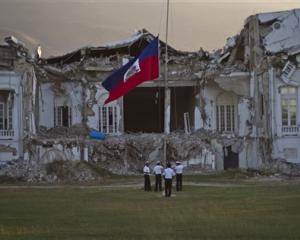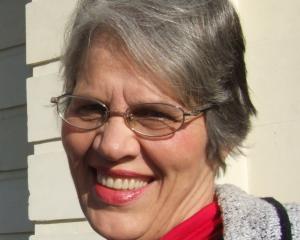Robyn Couper has shed enough tears.
Miss Couper (59), who spent 33 years as a missionary in Haiti, said she would not be doing any more crying.
Instead, she had told herself to "get off your butt . . . and do something".
Since news broke of the devastating earthquake last week, she has been overwhelmed by the support she has received from the North Otago community.
It was "absolutely fabulous" and made her feel very glad that she had grown up in Oamaru.
Things have moved quickly, with the formation of Project HHH - Hearts and Hands for Haiti - an emergency relief project.
And, like any others that had lived and worked in Haiti for a long time, she knew exactly where to go and where to provide help that others could not provide.
"I'm not looking at the wider picture, because it's not possible. That's for the people that are qualified to do the wide picture.
"I'm looking for the little picture and those that I personally know will fall through the cracks.
I'm looking at going into a hole and filling a gap that will just be bypassed," she said.
When the Haitian city of Gonaives was flooded by tropical storm Hana in September 2008, the only help some of the worst affected people got was donations from Ms Couper's friends in Oamaru and the Anglican Church in Wanaka, along with her church in Cap Haitien.
But Miss Couper said she would not be able to do anything without the support of many friends and supporters who were all offering to help.
"I couldn't do it alone. It's not about me, it's about what North Otago can do," she said.
She envisaged initially working with community leaders in Cap Haitien, the city where she was mostly based.
If anyone had told Miss Couper when she first went to Haiti, that she would be there for 33 years, she would have laughed at them.
That was a trial to see if she could cope with the stresses of living in another country and culture.
It was one thing to visit for a while, but a much different thing to be an effective worker in another country, she said.
When she heard a nurse was needed for Haiti, she was not particularly interested, because she wanted to work in China.
But then she felt a prompt to go to the poverty-stricken country.
Initially, Miss Couper was nursing in Haiti and then was involved with community health.
She then became involved in prayer and counselling ministry, Bible teaching and wrote, in French, a foundation manual in Christian beliefs.
She also did some secretarial work in the church.
Asked her first impression, Miss Couper said Cambodia had been through a war and she could "understand where it was at".
"Here I was coming to a country that had been independent since 1804 and I couldn't understand, if there hadn't been a war, the poverty issue."
People had to have a really good understanding of the history of Haiti to know it was not just a victim of some of its own problems.
It was also a victim of colonisation, the slave trade and other countries that had interfered in the politics.
"Haiti has just been on a perpetual slide down. They are not just flat on their face, they are buried up to their neck in mud," she said.
It was a country that had absolutely nothing, it had a huge crime rate and instability.
People lived in crammed conditions and, in the best of times, there was no infrastructure and medical care was very basic.
If anyone was sick and went to hospital, a family member or friend would have to go and purchase the medication or medical supplies for them.
Miss Couper had first-hand knowledge of the inadequacy of the health system.
She suffered a massive coronary in 2000 and hospital staff did not believe she would survive.
"They didn't even have the medical care I needed. Things are just so inadequate," she said.
Yet, there was something about Haiti "that just gets into you".
And while she belonged to two places, she considered Haiti was her home.
She had lived in a totally Haitian environment, speaking English only when she bumped into another white person.
Despite the unrest in the country, Miss Couper said she felt God wanted her there so she knew she was in a "safe place".
"Sure, things can happen, but if you're where you feel you're supposed to be, you don't worry about all the rest.
"I believe in living and doing what you believe you were called to do. My faith plays the biggest part of why I do anything I do."
Her home was an open home, often with more than 20 gathering for a midday meal, and she never had her bedroom to herself.
Young people were often staying with her, some for years.
Haitian people were resilient, ingenious and "just tough".
They were also spiritual people and very generous.
When she had her coronary, there were six people sleeping on the floor of her hospital room to take care of her.
Miss Couper has been having "terrible" problems trying to communicate with her friends and associates in Haiti but found that text messages were getting through.
Most of her friends in Cap Haitien were safe, there had been some "miraculous" escapes for others who were in Port-au-Prince and had now returned to Cap Haitien, and a few that she had quite close links to were dead.
She did not yet know if some young people, who had been through her home, were alive or dead.
Miss Couper cried for days before she left Haiti at the end of August last year to return to New Zealand for family reasons.
"It was just dreadful. The day I left I thought I was being torn literally in two."
Those she had communicated with in recent days were "rapt" that she was going to be returning.
An email from one friend said "Right now, Haiti needs you more than ever before".
It had been sad not knowing when he would see her again and he was really happy that she would be "back home" and Project HHH was a "wonderful" project.
Now Miss Couper thinks she might have been meant to be back in New Zealand, "maybe for such a time as this, so I could reach a few people and maybe generate a community interest in Haiti, maybe a national interest".





